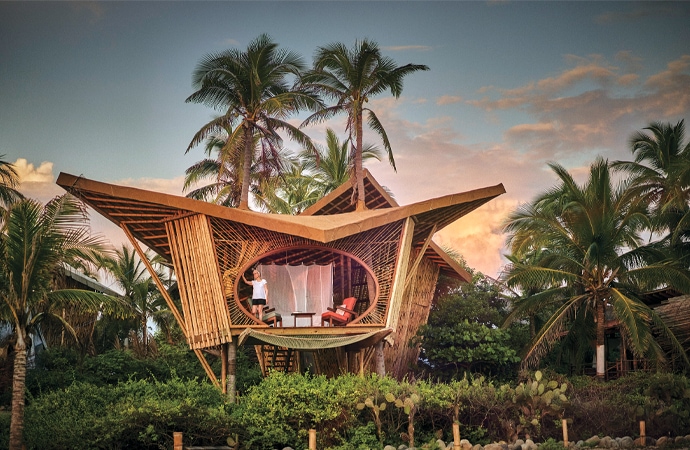The Hospitality Industry Is Devising Innovative Ways to Go Plastic-Free
What will it take for hotels—everywhere—to ditch plastic?
by Todd Plummer
February 21, 2023

The Ritz-Carlton Maldives, Fari Islands / Photo: Courtesy of Christopher Cypert
As the global hospitality community wakes up to the urgency of sustainability, going plastic-free is starting to take center stage. Of course, there have long been the high-end eco-resort concepts that have prioritized plastic-free practices. Playa Viva in Zihuatanejo, Mexico, has been plastic-free since its opening in 2008. And in 2022, The Ritz-Carlton Maldives, Fari Islands, launched the country’s first resort-based conservation technology project using drones. A team of scientists will study aerial photography of Indian Ocean waters to map habitat health and target large pieces of plastic debris for removal.
But still, for every bungalow in the Maldives that gives you an aluminum water bottle at check-in, there are 30 budget hotels across the American Midwest where single-use plastic bathroom amenities are still the norm. What will it take for hotels—everywhere—to go plastic-free?

Playa Viva, Zihuatanejo, Mexico / Photo: Courtesy of Playa Viva
It can be done. Six Senses, a company with 20 hotels and resorts in 17 countries and more than 34 properties in development in the next few years, is setting a great example. The brand announced that at the end of 2022, it had eliminated all unnecessary plastic packaging in its room amenities and retail spaces, and introduced more reusable solutions for back-of-house operations—a goal it had worked towards for five years.
“When the world woke up to plastic straws, we realized we needed to go much further,” says Jeff Smith, the company’s VP of sustainability. “The journey began with an inventory of all plastics—once straws and bottles had been eliminated—and now continues with supplier engagement, seeking natural materials and circular solutions.”
But just because a hotel wants to go plastic-free does not mean its economies of scale will allow it to do so. At the Weekapaug Inn on the Rhode Island coast, area director of housekeeping and sustainability Bret Campbell expects that when the property reopens after its seasonal closure, all guest amenities will be plastic-free.
Several challenges remain, largely in the back of house. Many food vendors in the region still rely on plastic packaging. And while he has found biodegradable nitrile gloves, they cost about three times as much as their non-biodegradable counterparts. “Costs are still very much a factor when you’re going plastic-free,” Campbell says.
But more and more start-ups around the world are coming up with commercial-grade solutions that could suit the hotel industry. For example, when the 136-year-old Raffles Hotel Singapore reopened after a historic renovation in 2018, there was outrage in the spirits world that the hotel’s signature Singapore sling cocktail had been altered. While the recipe stayed largely the same, the hotel had partnered with packaging service EcoSpirits to bring the drink into the 21st century with a smaller carbon footprint.
By using EcoSpirits’ Eco-Tote circular packaging for the drink’s gin, cherry liqueur and dry curaçao, and replacing single-use plastic straws with biodegradable potato-starch straws, the hotel has eliminated several thousand kilograms of packaging waste per year. The hotel also participates in EcoSpirits’ Forest Program, which for every 25 Singapore slings sold plants a tree in Indonesian rain forests. EcoSpirits has also announced several new partnerships, including one with Rosewood Hotels & Resorts. If that isn’t something worth raising a glass to, we’re not sure what is.




